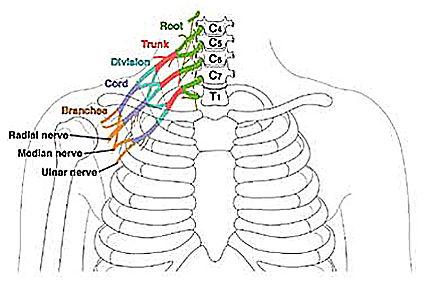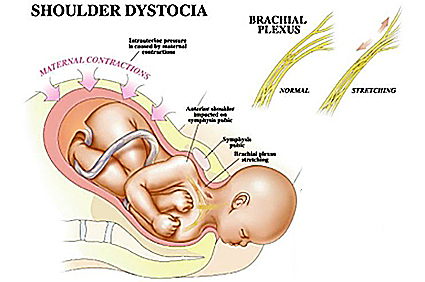How selfish and immature do you have to revel in the homebirth of a baby who suffered nerve damage as a result?
An initial check reveals a brachial plexus palsy in her right arm, a tender neck, and some bruising, but otherwise Virginia has come away unscathed.
Melanie, you ought to stop congratulating yourself for risking and then injuring her daughter. She did not come away unscathed. She suffered nerve damage which may lead to lifelong paralysis of her arm.
The story is classic homebirth stupidity and self-deception:
The next day (42+1) I called Debbie to talk options. I was DONE. I was pretty sure that if she broke my water I’d go quick, but neither of us really wanted to do that cold. We also discussed doing a biophysical profile with the OB on Monday, but I didn’t like that much either. We finally decided to try stripping my membranes again, and if that triggered labor Debbie would come break my water. We were committing–no fizzling out this time. At the appointment I measured 37 weeks and wondered if the baby was losing weight. Ha!
Awesome! Postdates and possible failing placenta.
Anyway, the stripping worked and on the way home I started having some decent contractions, about two minutes apart. They remained consistent throughout the car ride and during a brisk walk with my mom at home. After about an hour of consistent contractions I called Debbie to tell her I was in labor, and she said she’d come over. I also called my sister Jenny and friend (and doula) Pam.
We packed the girls off with my dad, and Jamie, my mom, and I waited, me laboring on the birth ball. Jenny arrived, followed by Rachael, Corrinna (the apprentices), and Pam. I felt strange that all these people were here to watch me, and a little self-conscious. Were there too many people? Later I’d be grateful for all those hands…
Her husband and 6 other people watching. So much for the intimacy of homebirth.
Melanie’s labor progressed uneventfully. Then:
At this point things get a little hazy for me. I remember what happened but not really how it felt. It seemed quick and so slow at the same time. I was semi-sitting as I pushed the head out. When Debbie told me to flip onto my hands and knees, the doula in my head immediately turned to that page in Ina May’s Guide to Childbirth about the Gaskin Maneuver. Shoulder Dystocia.
Don’t think, just do what she tells me. Stand up. No, this isn’t working. Walk (waddle) to the bed. I end up on my hands and knees, gripping the headboard, pushing with all my might while Debbie pulls desperately on the baby’s head. Please, baby, please come out! I had no urge to push, but was trying as hard as I could. Still not working. Flip over, Melanie. Knees to your ears. PUSH!
I don’t remember the pain, but I remember how hard it was. How ineffective it felt. Everyone around me encouraging me, begging me to push, and feeling like it wasn’t doing a damn thing. How much time has gone by?
Surprise, being able to move freely does not prevent shoulder dystocia! Surprise, the Gaskin maneuver fails! What works? Surprise, being flat on her back, purple pushing and the McRoberts maneuver!
Debbie finally reaches her arm inside me, behind the head, and releases the shoulder that is stubbornly caught on my pubic bone. I feel the baby come out of me. Finally! I cry. I can’t look down, not yet. I’m waiting. Debbie is rubbing the baby with a towel. Then I hear it, the sound I’m waiting for. A sweet baby cry. Oh my God! The sweetest sound in the whole world. I cry harder and look down at my baby. My relief in this moment is as powerful as the contractions that were gripping my body minutes ago. Debbie places Virginia on my belly and I meet my baby girl. She is beautiful and perfect…
No, Melanie. She is not perfect. She is hurt. Her arm is paralyzed. It may be temporary; it may be permanent. That’s going to be a serious problem if she is right handed. You’ve just paralyzed her dominant arm.
Perhaps Melanie thought that the only danger to her baby was the danger of death. That was indeed a real danger and is the worst possible outcome of a shoulder dystocia. However that is not the only outcome. A much more common outcome of shoulder dystocia is damage to the nerves that supply the arm with temporary or permanent paralysis as a result.
What is the brachial plexus? According to the University of Pittsburgh Department of Neurological Surgery:
Brachial relates to the arm and plexus pertains to a network of nerves. The brachial plexus forms a network of nerves that conduct signals that control the muscles of the shoulder, arm, elbow, wrist, hand and fingers.
How does an injury occur?
The mechanism(s) by which the brachial plexus is injured is most often attributed to severe lateral flexion of the neonate’s neck when the shoulder is stopped most often at the pubic bone (“shoulder dystocia”) during delivery. The extent of the traction on the brachial plexus may result in various types of injuries to the nerves, from a simple mild stretch injury up to and including avulsion (separation) of the nerves from the spinal cord.
The following illustration shows how the nerves travel through the neck to the arm.
You can see how pulling the head down to dislodge the shoulder can stretch and injury these nerves.
The result is a specific type of paralysis, an Erb’s palsy, also known as the waiter’s tip deformity, because it looks like a waiter reaching back for a discreet tip.
The nerve damage my resolve on its own, improve with physical therapy or require surgery under general anesthesia to repair. If a nerve has been severed, as opposed to stretched, repair may not be possible and the deficit will be permanent.
Melanie does not understand this yet:
We all slowly start breathing normally again, and then even begin smiling, laughing, joking. Crisis over! A child is born! Joy! About 90 minutes later Debbie does the newborn exam. The moment of truth: Debbie weighs Virginia. “Mind if I snicker?”, she says after reading the scale to herself. She turns it around and we all shriek. 10 pounds!! What?! I just gave birth to a 10 pound baby. In my bed. At home. Surrounded by people I love and trust. More Joy. My heart swells. What an experience!
If the deficit is permanent, Melanie will learn a lot more than she ever wanted to know about nerve damage.
She’s right about one thing, though. It was all about the experience, HER experience. I wonder how she will explain to her daughter that a permanently disabled arm was a small price for Virginia to pay for Melanie’s birth experience.





